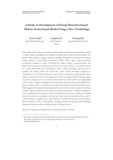

PARTNER
검증된 파트너 제휴사 자료
A Study on Development of Group Dynamics-based Debate Instructional Model Using a New Technology
방대한 850만건의 자료 중 주제별로 만들수 있는 최적의 산출물을 해피 캠퍼스에서 체험 하세요 전문가의 지식과 인사이트를 활용하여 쉽고 폭넓게 이해하고 적용할수 있는 기회를 놓치지 마세요
27 페이지
최초등록일 2015.03.25
최종저작일
2010.10

-
 * 본 문서는 배포용으로 복사 및 편집이 불가합니다.
* 본 문서는 배포용으로 복사 및 편집이 불가합니다.
미리보기
서지정보
· 발행기관 : 한국교육공학회
· 수록지 정보 : Educational Technology International / 11권 / 2호
· 저자명 : Eunmo SUNG, Sunghee JIN, Yoonjung KIM
목차
Introduction
Theoretical Background
Research Method
Group Dynamics-based Debate Instructional Model
Conclusions
References초록
The purpose of this study was to develop an instructional model using new technologies aimingto secure students' learnability and to enhance the public school values in the rural districts. Thepresent study attempts to suggest a practical e-learning instructional and learning model namedGroup Dynamics- based Debate Instructional Model', which utilizes unique technologyenvironment conditions in most. To develop the model, concepts of group dynamics anddebate-based instructional models were reviewed. And in-service teachers in two public schoolsin a certain rural district were interviewed in order to collect and analyze their needs for ateaching and learning model with which they utilizes unique technology conditions asenvironment in most. Based on literature review and the need analysis, a group dynamics-baseddebate instructional model has been suggested in terms of conceptual model. And then expertassessment composing of five in-service teachers from the model schools was implementedtwice in order to acquire the suggested model validation, followed by the model validation by agroup of experts. Then a revised group dynamics-based debate instructional model has beenfinally suggested. The group dynamics-based debate instructional model is expected to build upmembers' affective connection in the process, to generate group value, or collective intelligence,and to establish positive discussion culture. Furthermore, beyond of just utilizing the existingmaterials, learners are encouraged to develop and collect their own materials and data such asexpert's interview, or public news for their argument or refutation. In doing so, learners enhancetheir learnability as well as accountability, prompting self-directed learning, and establishingappropriate discussion culture resulting in positive learning outcomes.참고자료
· 없음태그
-
자료후기
-
자주묻는질문의 답변을 확인해 주세요

꼭 알아주세요
-
본 학술논문은 (주)학지사와 각 학회간에 저작권계약이 체결된 것으로 AgentSoft가 제공 하고 있습니다.
본 저작물을 불법적으로 이용시는 법적인 제재가 가해질 수 있습니다. -
해피캠퍼스는 구매자와 판매자 모두가 만족하는 서비스가 되도록 노력하고 있으며, 아래의 4가지 자료환불 조건을 꼭 확인해주시기 바랍니다.
파일오류 중복자료 저작권 없음 설명과 실제 내용 불일치 파일의 다운로드가 제대로 되지 않거나 파일형식에 맞는 프로그램으로 정상 작동하지 않는 경우 다른 자료와 70% 이상 내용이 일치하는 경우 (중복임을 확인할 수 있는 근거 필요함) 인터넷의 다른 사이트, 연구기관, 학교, 서적 등의 자료를 도용한 경우 자료의 설명과 실제 자료의 내용이 일치하지 않는 경우
“Educational Technology International”의 다른 논문도 확인해 보세요!
-
Case Study of Publishing and Using Open Courseware: Perspectives of In.. 24 페이지
Knowledge can be more meaningful when it is shaped and personalized through interactionwith others. Implementation of open learning environments such as open courseware orshared knowledge communities .. -
Psychological Distance between Students and Professors in Asynchronous.. 26 페이지
Relationships between students’ perception of psychological distance with online professors and theiracademic learning achievement and their intention to continue online learning were examined. Thecou.. -
The Effects of Group Composition of Self-Regulation on Project-based G.. 17 페이지
Collaborative learning encourages the use of high-level cognitive strategies, critical thinking,and interpersonal relationships. Despite these advantages, most instructors reveal thedifficulties of us.. -
Identifying Learner Behaviors, Conflicting and Facilitating Factors in.. 33 페이지
The purpose of this study is to identify patterns of learner behaviors, conflicting andfacilitating factors during collaborative work in an online learning community(OLC). Thisstudy further seeks to i.. -
Toward a Systemic Approach to Quality Assurance in e-Learning: An Ecol.. 17 페이지
Challenges brought by applications of advanced technologies in education call for newapproaches that can best ensure the provision of quality e-learning experiences. This paperpresents an ecological a..
-
정가5,600원
-
지식판매자(주)학지사 P
-
페이지27 페이지
어도비 PDF
-
최초등록일2015.03.25
-
최종저작일2010.10
-
문서 초안을 생성해주는 EasyAI

